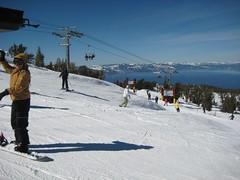Cessationism (or not) --> false prophets --> new age --> Sarah Calling --> or not --> end times?
Did you get all that?
In the past I've read about cessationism vs. continuationism and have come down on...I'm still not sure. What I am sure of is that the Canon is closed. I'm sure that Jesus isn't writing any more Scriptures. I'm sure that modern day prophets are doing it wrong.
That would make them "false prophets" and Jesus said there would be lots of them in the end times. Not only that, but He said that many would come in His name - even claiming to be Him.
A while ago, I bought "Jesus Calling" by Sarah Young. The only reason I'd suggest that anybody own it is so that they know what it says, and I'd only suggest reading it if you first read "Another Jesus Calling" by Warren Smith.
The "Jesus" in "Jesus Calling" is so...nice. It's easy to get sucked into the passivity and neediness of that Jesus. But the Jesus of Scripture talked about sin, and repentance, and -yes- false teachers.
Sarah Young said that she read Scripture, but that she longed for "more"(1.) - and more is what she got. She longed for more, but a few days into her book, I longed for "deep." Her Jesus is so unlike the Jesus of Scripture, that Phil and I started calling the book "Sarah Calling" because the voice in her head is...the voice in her head.
But then I read "Another Jesus Calling" and I'm not sure what to call Young's book. Warren Smith came out of the New Age movement and he knows what he's talking about. When he compares "Jesus Calling" to "God Calling" - he knows what he's talking about. And when he compares both of these to "The Revelation" (Barbara Marx Hubbard) - he knows what he's talking about.
Smith describes a scene from "The Beautiful Side of Evil" (Johanna Michaelsen) and how Michaelsen was given her "spirit guide" - Jesus. She challenged her jesus at L'Abri, When challenged, this jesus disappeared.
Young also went to L'Abri.
Smith writes:
TWO young women traveled to L’Abri Christian communities run by Francis and Edith Schaeffer with two very different outcomes. Johanna Michaelsen’s visit to L’Abri resulted in the abandonment of her “Jesus” presence when she realized he wasn’t the true Jesus Christ. Yet Sarah Young’s visit to L’Abri resulted in the immediate acceptance of her “Jesus” presence, which she just “knew” was Jesus Christ(2)
False teachers have always been with us. But Young's "jesus" has inspired her to turn out 15 books - half the size of the New Testament. In her study Bible, you can read the "jesus" of "Jesus Calling" right next to the "Jesus" of Scripture.
False teachers have always been with us. But Young has seven titles in the top 50 Christian bestsellers list, and she is consistently in the top 10. The "Jesus Calling" facebook page has nearly 140,000 followers.
The first time I visited New City Church, I had finished my first look at "Jesus Calling" and wanted nothing more to do with it. It was this great service, but at the end of it, a woman got up to give her testimony and went on about this great book that changed her outlook! Yeah..."Jesus Calling." I almost didn't go back, but Phil challenged me to ask myself if the pastor (or anybody) had known.
Jesus talked about the end times:
For false Christs and false prophets shall rise, and shall shew signs and wonders, to seduce, if it were possible, even the elect. (Mark 13: 22)
How many people have fallen for the jesus of "Jesus Calling?"
How many believe that Jesus needs us more than we need Him?
How many people embrace New Age demonic terminology, beliefs, and practices, all in the name of the jesus of "Jesus Calling?"
There is much error in "jesus Calling" - Smith exposes it. I want to pass it along.
- Jesus Calling; Young, Sarah; introduction
- Smith, Warren B. (2013-11-19). Another Jesus Calling (Kindle Locations 327-330). Lighthouse Trails Publishing. Kindle Edition.


 (I like this one from the air, because you can clearly see the airstrip and I had seen a little plane landing there)...
(I like this one from the air, because you can clearly see the airstrip and I had seen a little plane landing there)...